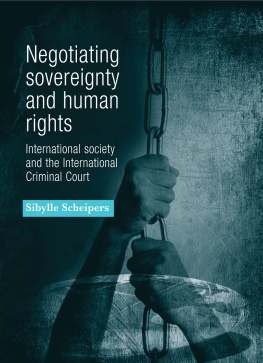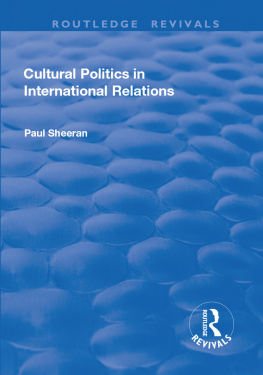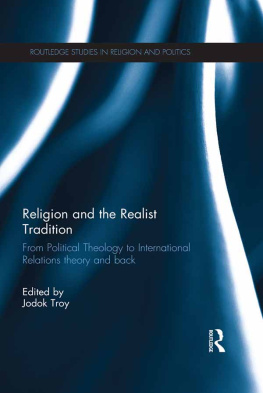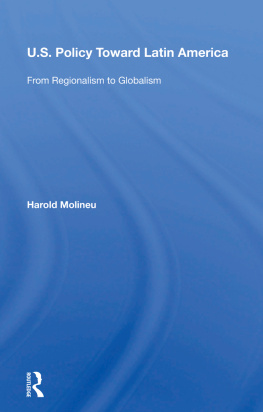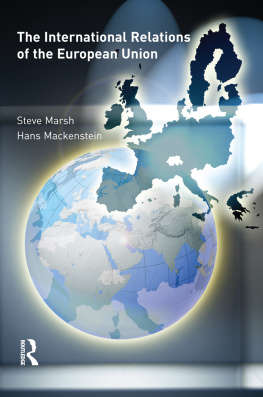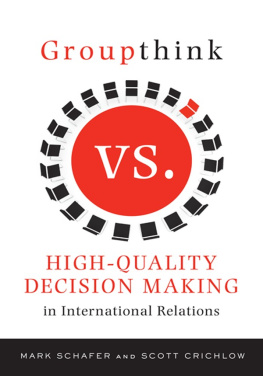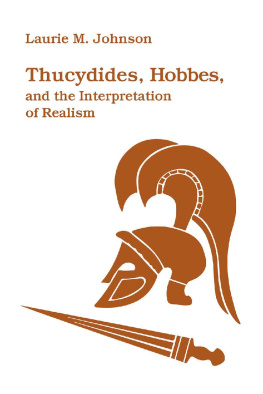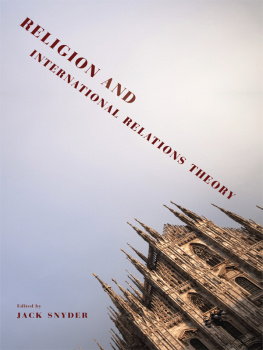Globalism Versus Realism
Also of Interest from Westview Press
Change in the International System, edited by Ole R. Holsti, Randolph M. Siverson, and Alexander L. George
The Theory and Structure of International Political Economy, edited by Todd Sandler
The Challenge of the New International Economic Order, edited by Edwin P. Reubens
Self-Determination: National, Regional, and Global Dimensions, edited by Yonah Alexander and Robert A. Friedlander
Politics, Values, and Public Policy: The Problem of Methodology, Frank Fischer
Studies on a Just World Order: Volume 1-Toward a Just World Order, edited by Richard Falk, Samuel S. Kim, and Saul H. Mendlovitz
Nations and States: An Enquiry into the Origins of Nations and the Politics of Nationalism, Hugh Seton-Watson
Transnational Enterprises: Their Impact on Third World Societies and Cultures, edited by Krishna Kumar
Managing Transnationalism in Northern Europe, Bengt Sundelius
The Foreign Policy Priorities of Third World States, edited by John J. Stremlau
Nonstate Actors in International Politics: From Transnational to Substate Organizations, Phillip Taylor
Global Human Rights: Public Policies, Comparative Measures, and NGO Strategies, edited by Ved P. Nanda, James R. Scarritt, and George W. Shepherd, Jr.
Psychological Models in International Politics, edited by Lawrence S. Falkowski
Available in hardcover and paperback.
About the Book and Editors
Globalism Versus Realism: International Relations' Third Debate
edited by Ray Maghroori and Bennett Ramberg
Since World War I, when the movement toward a comprehensive and systematic examination of international relations began, two intensive debates about the nature and methodology of the discipline have helped shape the field. The first was between the realist and the idealist schools; the second, between the traditionalists and the behavioralists. Now, a third debate has emerged, pitting state-centric conceptualizations against the globalist focus on interdependence. At issue is the nature of the international system. Is it still one in which the sovereign nation-state constitutes the dominant actor? Or has a process of global political, economic, and even social integration transformed the world into a "global village"?
This text presents seminal works that define and illuminate the third debate, focused by the editors' comments prefacing each chapter and their synthesizing introductory and concluding chapters. It is designed to allow students and scholars to compare and contrast the contending approaches in order to better understand and develop the discipline of international relations. Given the consensus among both realists and globalists that our assumptions about world affairs affect how we construct theories to explain events and that the model we impose on the world directly affects the policies we prescribe, it is difficult to overemphasize the importance of the subject.
Ray Maghroori is a lecturer in political science at the University of California in Riverside and has also lectured at the University of California in Santa Cruz. He is the coauthor of The Yom Kippur War: A Case Study in Crisis Decision-Making in American Foreign Policy (1981). Bennett Ramberg is a research associate at the Center for International and Strategic Affairs at the University of California in Los Angeles. He was a congressional foreign policy consultant in 1970 and 1972, and he served as a member of President Carter's Nuclear Disarmament Task Force in 1976. His most recent book is Destruction of Nuclear Energy Facilities in War: The Problem and the Implications (1980).
Globalism Versus Realism: International Relations' Third Debate
edited by Ray Maghroori and Bennett Ramberg
First published 1982 by Westview Press, Inc.
Published 2018 by Routledge
52 Vanderbilt Avenue, New York, NY 10017
2 Park Square, Milton Park, Abingdon, Oxon OX14 4RN
Routledge is an imprint of the Taylor & Francis Group, an informa business
Copyright 1982 Taylor & Francis
All rights reserved. No part of this book may be reprinted or reproduced or utilised in any form or by any electronic, mechanical, or other means, now known or hereafter invented, including photocopying and recording, or in any information storage or retrieval system, without permission in writing from the publishers.
Notice:
Product or corporate names may be trademarks, or registered trademarks, and are used only for identification and explanation without intent to infringe.
Library of Congress Cataloging in Publication Data
Main entry under title:
Globalism versus realism.
Includes bibliographic references and index.
1. International relationsAddresses, lectures. I. Maghroori, Ray.
II. Ramberg, Bennett.
JX1391.G53 327.1 82-2770
AACR2
ISBN 13: 978-0-367-01917-4 (hbk)
Contents
Globalism Versus Realism
JAMES N. ROSENAU
Although the observations of the editors and the analyses of the authors that follow do not actually constitute a debate, in that they are not responding directly to each other, they certainly reflect different perspectives on the dynamics of present-day world politics. And the differences among them are not trivial or picayune. They spring, rather, from conflicting assumptions about the structure of international systems, the nature of the order that underlies them, the operation of the causal processes that give rise to recognizable outcomes, the identity of the central actors, and the degree to which change and continuity are likely to mark the course of events. To an important extent, moreover, these differences are both a source and a consequence of diverse methodological premises.
Let us be clear about what the differences amount to. They are not different "schools of thought," because in some instances the underlying philosophical foundations are taken for granted and are not examined or justified. Nor can the differences be viewed as constituting "analytic frameworks," inasmuch as more often than not the premises and procedures governing inquiry are implicit and inchoate, and thus lack the degree of articulation and coherence necessary to frame and guide analysis. Likewise, the differences can hardly be treated as summing to competitive theories, since integrated propositions about the interaction of key variables are conspicuously absent from most formulations. Notwithstanding their lack of theory, structure, and coherence, however, the aforementioned differences are sufficiently important to justify differentiation among students of world politics today in terms of their general approach toor perspective onthe phenomena of the field. An approach or perspective is much looser and broader than a school of thought, a framework, or a theory, but it does derive from some organizing assumptions about the nature and dynamics of international relations.
Exactly how many general approaches to the field can be distinguished in the work of its practitioners depends, of course, on how the differences among them are conceptualized. As the editors point out in)one that is peripheral to the main work in the field but that does attract some adherents by virtue of its stress on economic variables.
It is perhaps useful to note that the labels attached to the various approaches fall far short of designating a central tendency and can therefore be highly misleading. Most notably, they tend either to exaggerate or to understate what those who proceed under each label actually do or believe. Surely, for example, realists are not the only analysts who feel confident they are focusing on the realities of world politics. Doubtless those who employ each approach see themselves as realistically assessing and interpreting the course of events. Similarly, the behavioralist label connotes a focus on action and interaction that is hardly the exclusive concern of behavioralists. Realists and globalists also see themselves as preoccupied with the flow of behaviors that sustain international life. To confound matters further, at least one of the labels (behavioralist) also suggests a methodological orientation, whereas the others seem exclusively confined to substantive concerns. In short, one is well advised to beware of the labels used in the field and, instead, to think of the various approaches in terms of the central assumptions on which they rest.




